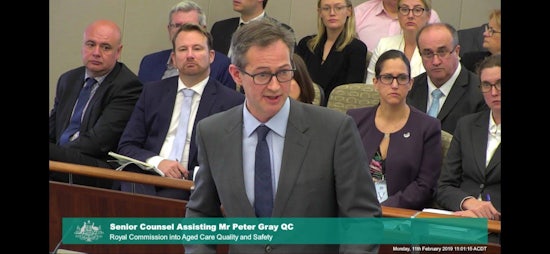ROYAL COMMISSION: “Significant imbalance of power between recipient and provider”
Ineffective funding models, review and accreditation processes, staff ratios, and society attitudes towards ageing Australians were among issues raised during the first Royal Commission into Aged Care Quality and Safety hearing in Adelaide today.

Peter Gray QC makes his opening address at the Royal Commission hearing in Adelaide.
Senior Counsel Assisting Peter Gray QC says the eight-day hearing, held from February 11-13, then 18-22 February, will aim to provide background information for what is to come in future hearings, and identify the current concerns across Australia’s aged care system.
Mr Gray says the current system is “overly complex”, likely due to frequent changes over the past 30 years acting as band-aid solutions.
“Too often, the reforms made to aged care have been addressing a problem in isolation rather than the system as a whole. The sheer number and frequency of reviews shows that there are many issues in aged care which have not been resolved to the community’s satisfaction,” he says.
Mr Gray says the Royal Commission will challenge all Australians to reflect on their attitudes towards the ageing population.
“We have a lot of work to do to improve our attitudes to older Australians, and the way we think about and plan for ageing,” he says.
“We should have a society where all Australians are valued over their entire lifespan. But that message is not being heard clearly enough. Age-based discrimination is prevalent in our society, in many forms.”
“A culture of appreciation and respect for older people is needed. The thousands upon thousands of informal and unpaid carers of elderly partners, relatives and friends must be given the supports they need.”
Barbara Spriggs, whose husband Bob suffered abuse while in Adelaide’s now-closed Oakden Older Persons Mental Health Service in 2016 before he passed away aged 66, was first to address the Commission alongside her son Clive.
Highlighting her concerns and experience with the aged care complaints and accreditation systems, staff actions, and the disregard of her husband’s end of care life plans, Mrs Spriggs says speaking out about her husband’s experience took a huge toll on her family.
“Speaking out is not an easy thing to do. I should not have had to battle long and hard for months to be heard,” she says. “I think there is no accountability for wrongdoing in the system.”
“I found it very difficult, frustrating and time-consuming to get answers to my questions and have my concerns taken seriously.”
Mrs Spriggs says she hopes the Royal Commission will ensure no one else goes through a similar experience.
“We need to learn to move forward from our mistakes and develop an aged care system that Australia can be proud of. It needs to be one where we know that our loved ones are given the care, dignity and respect that they deserve.”
Also addressing the Commission, Council on the Ageing (COTA) Chief Executive Ian Yates says there are a lack of incentives and rewards for aged care providers to ‘strive for excellence’, and suggests there should be more levels of accreditation beyond the current ‘pass/fail’ model.
“We need to actually recognise those who do far better than others,” he says.
Mr Yates says COTA would like to see a “great deal more” publication of complaints and resolutions, adding that providers should encourage clients to come forward with issues so they can be resolved as quickly as possible.
“It’s worth noting there is a significant imbalance of power between recipient and provider. There can be a nature of fear about complaining in most people…we need to make people feel comfortable (to come forward).”
National Seniors CEO John McCallum also appeared as a witness, touching on mandatory dementia training, waiting lists and ageism in the workforce and community.
Earlier this year, the Commission wrote to the almost 2000 aged care providers across Australia requesting details on their services, and had received over 900 responses by the due date earlier this month. Out of the 100 largest providers, 79 have responded.
Mr Gray says the Commission has received over 800 public submissions, many of which raise concerns about substandard care in residential facilities, unsafe aged care services and staffing levels.
Over the next two weeks, the Commission will hear from as many as 26 witnesses from representatives across the sector, including medical and nursing professional bodies such as the Royal Australian College of General Practitioners and other advocacy bodies including Leading Age Services Australia (LASA) and Aged and Community Services Australia (ACSA). Representatives from the Australian Bureau of Statistics and Australian Institute of Health and Welfare are expected to give evidence tomorrow.
In future hearings from March through to September, Mr Gray says the Commission will look at home care, residential care, dementia and people with disability receiving aged care services.






















